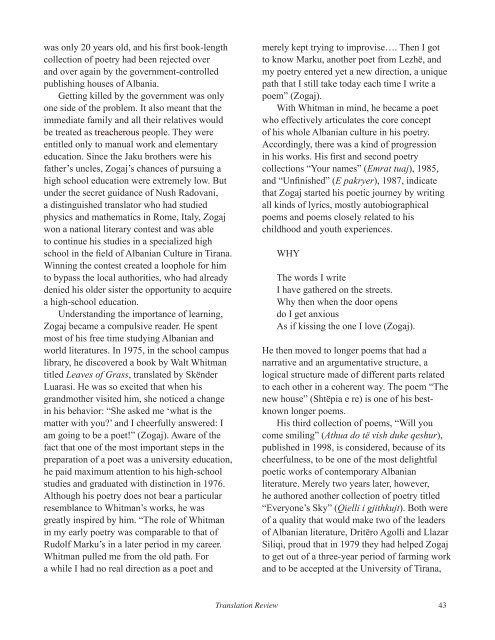Table of contents - The University of Texas at Dallas
Table of contents - The University of Texas at Dallas
Table of contents - The University of Texas at Dallas
Create successful ePaper yourself
Turn your PDF publications into a flip-book with our unique Google optimized e-Paper software.
was only 20 years old, and his first book-length<br />
collection <strong>of</strong> poetry had been rejected over<br />
and over again by the government-controlled<br />
publishing houses <strong>of</strong> Albania.<br />
Getting killed by the government was only<br />
one side <strong>of</strong> the problem. It also meant th<strong>at</strong> the<br />
immedi<strong>at</strong>e family and all their rel<strong>at</strong>ives would<br />
be tre<strong>at</strong>ed as treacherous people. <strong>The</strong>y were<br />
entitled only to manual work and elementary<br />
educ<strong>at</strong>ion. Since the Jaku brothers were his<br />
f<strong>at</strong>her’s uncles, Zogaj’s chances <strong>of</strong> pursuing a<br />
high school educ<strong>at</strong>ion were extremely low. But<br />
under the secret guidance <strong>of</strong> Nush Radovani,<br />
a distinguished transl<strong>at</strong>or who had studied<br />
physics and m<strong>at</strong>hem<strong>at</strong>ics in Rome, Italy, Zogaj<br />
won a n<strong>at</strong>ional literary contest and was able<br />
to continue his studies in a specialized high<br />
school in the field <strong>of</strong> Albanian Culture in Tirana.<br />
Winning the contest cre<strong>at</strong>ed a loophole for him<br />
to bypass the local authorities, who had already<br />
denied his older sister the opportunity to acquire<br />
a high-school educ<strong>at</strong>ion.<br />
Understanding the importance <strong>of</strong> learning,<br />
Zogaj became a compulsive reader. He spent<br />
most <strong>of</strong> his free time studying Albanian and<br />
world liter<strong>at</strong>ures. In 1975, in the school campus<br />
library, he discovered a book by Walt Whitman<br />
titled Leaves <strong>of</strong> Grass, transl<strong>at</strong>ed by Skënder<br />
Luarasi. He was so excited th<strong>at</strong> when his<br />
grandmother visited him, she noticed a change<br />
in his behavior: “She asked me ‘wh<strong>at</strong> is the<br />
m<strong>at</strong>ter with you’ and I cheerfully answered: I<br />
am going to be a poet!” (Zogaj). Aware <strong>of</strong> the<br />
fact th<strong>at</strong> one <strong>of</strong> the most important steps in the<br />
prepar<strong>at</strong>ion <strong>of</strong> a poet was a university educ<strong>at</strong>ion,<br />
he paid maximum <strong>at</strong>tention to his high-school<br />
studies and gradu<strong>at</strong>ed with distinction in 1976.<br />
Although his poetry does not bear a particular<br />
resemblance to Whitman’s works, he was<br />
gre<strong>at</strong>ly inspired by him. “<strong>The</strong> role <strong>of</strong> Whitman<br />
in my early poetry was comparable to th<strong>at</strong> <strong>of</strong><br />
Rudolf Marku’s in a l<strong>at</strong>er period in my career.<br />
Whitman pulled me from the old p<strong>at</strong>h. For<br />
a while I had no real direction as a poet and<br />
merely kept trying to improvise…. <strong>The</strong>n I got<br />
to know Marku, another poet from Lezhë, and<br />
my poetry entered yet a new direction, a unique<br />
p<strong>at</strong>h th<strong>at</strong> I still take today each time I write a<br />
poem” (Zogaj).<br />
With Whitman in mind, he became a poet<br />
who effectively articul<strong>at</strong>es the core concept<br />
<strong>of</strong> his whole Albanian culture in his poetry.<br />
Accordingly, there was a kind <strong>of</strong> progression<br />
in his works. His first and second poetry<br />
collections “Your names” (Emr<strong>at</strong> tuaj), 1985,<br />
and “Unfinished” (E pakryer), 1987, indic<strong>at</strong>e<br />
th<strong>at</strong> Zogaj started his poetic journey by writing<br />
all kinds <strong>of</strong> lyrics, mostly autobiographical<br />
poems and poems closely rel<strong>at</strong>ed to his<br />
childhood and youth experiences.<br />
WHY<br />
<strong>The</strong> words I write<br />
I have g<strong>at</strong>hered on the streets.<br />
Why then when the door opens<br />
do I get anxious<br />
As if kissing the one I love (Zogaj).<br />
He then moved to longer poems th<strong>at</strong> had a<br />
narr<strong>at</strong>ive and an argument<strong>at</strong>ive structure, a<br />
logical structure made <strong>of</strong> different parts rel<strong>at</strong>ed<br />
to each other in a coherent way. <strong>The</strong> poem “<strong>The</strong><br />
new house” (Shtëpia e re) is one <strong>of</strong> his bestknown<br />
longer poems.<br />
His third collection <strong>of</strong> poems, “Will you<br />
come smiling” (Athua do të vish duke qeshur),<br />
published in 1998, is considered, because <strong>of</strong> its<br />
cheerfulness, to be one <strong>of</strong> the most delightful<br />
poetic works <strong>of</strong> contemporary Albanian<br />
liter<strong>at</strong>ure. Merely two years l<strong>at</strong>er, however,<br />
he authored another collection <strong>of</strong> poetry titled<br />
“Everyone’s Sky” (Qielli i gjithkujt). Both were<br />
<strong>of</strong> a quality th<strong>at</strong> would make two <strong>of</strong> the leaders<br />
<strong>of</strong> Albanian liter<strong>at</strong>ure, Dritëro Agolli and Llazar<br />
Siliqi, proud th<strong>at</strong> in 1979 they had helped Zogaj<br />
to get out <strong>of</strong> a three-year period <strong>of</strong> farming work<br />
and to be accepted <strong>at</strong> the <strong>University</strong> <strong>of</strong> Tirana,<br />
Transl<strong>at</strong>ion Review 43

















